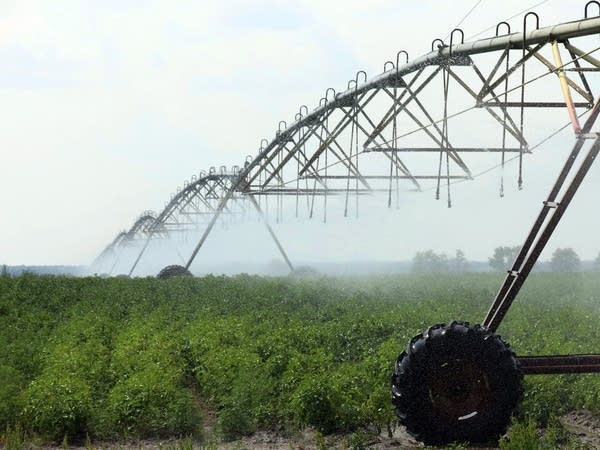Protesters take aim at McDonald's, potato giant over water use, pesticides

Starting Tuesday, you can buy a McDonald's breakfast all day long, but you might have to walk past protesters to get it in some Minnesota locations.
The Pesticide Action Network and Toxic Taters Coalition plan to gather outside 11 McDonald's restaurants around the state Tuesday to protest the use of pesticides on potato fields.
"I'm not going to criticize a good hash brown, but let's make sure they're produced in a way that doesn't harm local communities," said Lex Horan, an organizer with the Pesticide Action Network, which has its Midwest office based in Minneapolis.
Horan said the protest was timed to coincide with McDonald's all-day breakfast launch but is actually aimed at Fargo, N.D.-based producer R.D. Offutt Co. — the world's largest potato producer. Offutt supplies some of McDonald's fries and hash brown patties through several processing companies.
Create a More Connected Minnesota
MPR News is your trusted resource for the news you need. With your support, MPR News brings accessible, courageous journalism and authentic conversation to everyone - free of paywalls and barriers. Your gift makes a difference.
Horan said Offutt sprays too many pesticides on its crops, especially in central Minnesota where chemicals often blow over residential areas.
Offutt President Keith McGovern said protesting pesticides is a vast oversimplification of potato farming.
"We couldn't grow enough potatoes to feed a reasonable number of people without using crop protectants," he said.
McGovern said his company already tries to use the smallest amount of fertilizer, insecticide and fungicide in the most responsible ways. The company uses drones, infrared cameras and a crew of scientists to improve efficiency. He said the company couldn't cut chemical use any faster, even if McDonald's executives asked.
The protests follow recent controversies over the Offutt's use of land and groundwater.

Earlier this year Minnesota Department of Natural Resources Commissioner Tom Landwehr confronted the company on its plans to convert 12,000 acres of former pine forest across Becker, Cass, Hubbard and Wadena counties to potato fields. Offutt had purchased the land from Potlatch Corp., and requested 54 groundwater use permits from the DNR to irrigate it.
The large number of permits concerned Landwehr, who asked Offutt to file a series of environmental reviews estimating the impact of their expansion plan.
Offutt last month retracted all but five of those permit applications, which DNR Assistant Commissioner Barb Naramore said negates the need for the environmental reviews.
Those last five water permits, if granted, would mean the conversion of roughly 500 acres of central Minnesota forest to farm land. Horan said more farmland means more pesticides.
McGovern said his company only ever planned a slow expansion of fields, a handful each year as crop rotation permitted. He said they asked the DNR for water use permits to irrigate those fields years in advance, trying to settle the paperwork side of the farming business as efficiently as possible.
Withdrawing the vast majority of the permit requests doesn't necessarily mean they'll use less water than originally planned. McGovern said they just have to ask for the permits a few at a time, expanding their fields over many years.
"It's not enough to change the landscape of Minnesota," he said.
McDonald's officials did not return requests for comment.